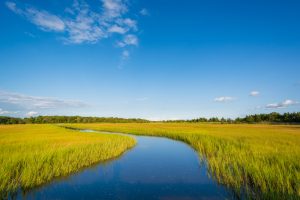Legal Blog
Businesses May Face Challenges in Reauthorization of Wetlands Approvals After NJDEP Decision
 Businesses in New Jersey seeking reauthorization of wetlands approvals may now be required to go through the more intensive individual permit process following a unique decision involving a wetlands permit issued to the New Jersey Department of Transportation (NJDOT). While this decision is somewhat unique as it involves a state agency as the permittee, it likely will limit the New Jersey Department of Environmental Protection’s (NJDEP) authority to reauthorize previously approved structures, activities, and features.
Businesses in New Jersey seeking reauthorization of wetlands approvals may now be required to go through the more intensive individual permit process following a unique decision involving a wetlands permit issued to the New Jersey Department of Transportation (NJDOT). While this decision is somewhat unique as it involves a state agency as the permittee, it likely will limit the New Jersey Department of Environmental Protection’s (NJDEP) authority to reauthorize previously approved structures, activities, and features.
In the latest development of this ongoing legal saga, In the Matter of Reauthorization of The Freshwater Wetlands General Permit #1 and Permit Modifications, Docket No. A-2758-21 (App. Div. June 7, 2024), the Appellate Division vacated the issuance of a Freshwater Wetlands General Permit by the NJDEP to the NJDOT. This permit was intended for the rehabilitation of a Confined Disposal Facility (CDF) to store dredged materials from multiple waterways. (A CDF is a structure planned and designed to receive sediments dredged from a waterway. Its primary function is to safely contain these materials, preventing contamination from reentering the waterway. In New Jersey, CDFs are critical in environmental management and sediment control.)
The Permitting of the CDF and Subsequent Challenges
The CDF at issue here was initially authorized in 1983 for the storage of dredged material from a single waterway. In 2018, NJDEP issued several permits to NJDOT in connection with the dredging of three waterways: Westecunk Creek, Parkers Run, and Cedar Run. This included a General Permit #1 authorizing the rehabilitation of the CDF.
By way of background, a General Permit #1 allows the repair or replacement of a previously authorized, serviceable structure that lawfully existed before July 1, 1988, in freshwater wetlands. Eligibility for a General Permit #1 requires that: “(1) [t]he previously authorized structure… has not been and will not be put to any use other than as specified in any permit authorizing its original construction” and “(2) [t]he activities do not expand, widen, or deepen the previously authorized feature, and do not deviate from any plans of the original activity,” except for certain “minor deviations.” N.J.A.C. 7:7A-7.1(a).
In 2021, based on challenges from local residents and environmental groups, the Appellate Division remanded the issuance of the General Permit to NJDEP for further consideration. After additional review, NJDEP reauthorized the General Permit in 2022. The present appeal arises from further challenges to this 2022 approval by local residents and environmental groups.
The Appellate Division’s Rejection of the General Permit
In a rare rejection of the deference owed to the NJDEP, the Appellate Division determined that NJDEP could not issue a General Permit #1 for the CDF due to differences between the initially authorized CDF activities and the currently proposed CDF activities under the new permit. Specifically, the Appellate Division found that the original 1983 permit only authorized the CDF to store dredged spoils from Westecunk Creek. In contrast, the General Permit allowed the CDF to store materials from three waterways. Therefore, the General Permit violated the requirement of N.J.A.C. 7:7A-7.1(a)(1), which prohibits “any use other than” what was originally authorized. Additionally, the Appellate Division concluded that the General Permit improperly “expanded” the CDF in violation of N.J.A.C. 7:7A-7.1(a)(2) because it authorized storage of nearly five times the originally permitted material. The Appellate Division also made noteworthy determinations regarding the continuity of the CDF’s operations despite the facility remaining dormant for many years, which could benefit developers and businesses in other contexts.
Wetlands Approvals: Implications of Recent Appellate Division and Chevron Decisions
As noted above, this unique decision may make it harder for businesses and developers to obtain reauthorization of wetlands approvals without pursuing an individual permit. When pursuing any development or rehabilitation projects, it is critical to consult with experienced professionals and legal counsel to develop a permitting strategy.
As a final matter, this decision was rendered before the United States Supreme Court overturned the long-established Chevron deference, which also limited an agency’s ability to interpret its own regulations. As a result, while it was not informed by the reversal of Chevron deference, the Appellate Divisions rejection of the determination of NJDEP here may be a harbinger of a shift in treatment of NJDEP decisions by the New Jersey courts.
ABOUT MATTHEW KARMEL

matthew.karmel@offitkurman.com | 973.245.9905
Matthew Karmel is passionate about sustainability and the environment and has been widely recognized for his influence and leadership in relation to the environment and the circular economy.
As the head of the firm’s Environmental and Sustainability Law practice area, Mr. Karmel represents a wide variety of businesses and individuals in connection with the full range of environmental matters.
ABOUT PAUL RECUPERO
|
Paul R. Recupero is an associate attorney in the firm’s Environmental and Sustainability and Real Estate Law and Transactions practice groups. Paul has built his career upon his dedication to pressing environmental and sustainability issues. Paul has experience representing a broad range of clients, from Fortune 100 companies to individual homeowners.

